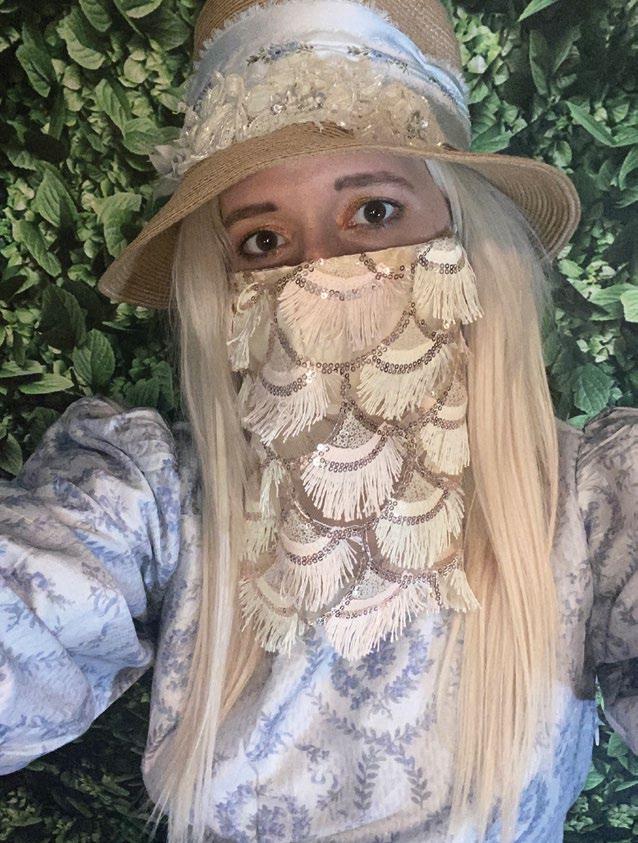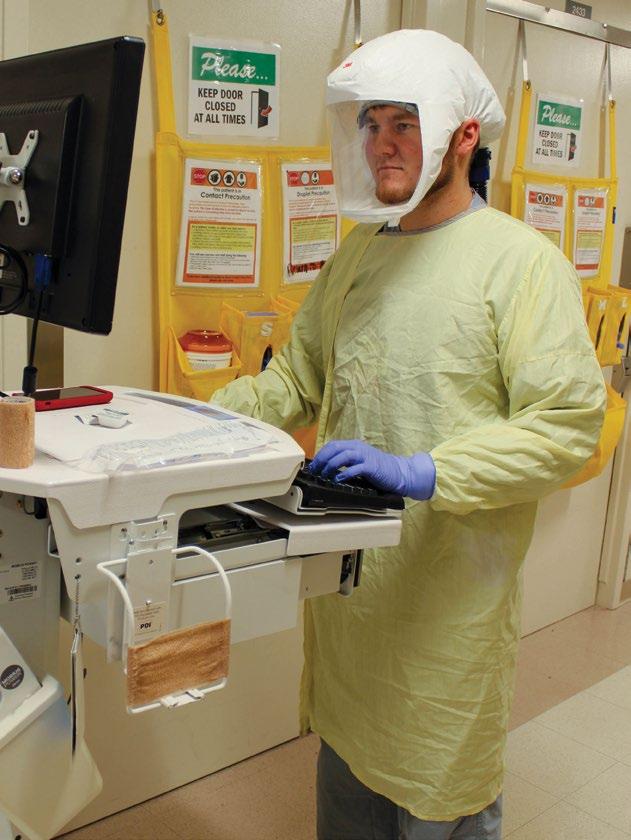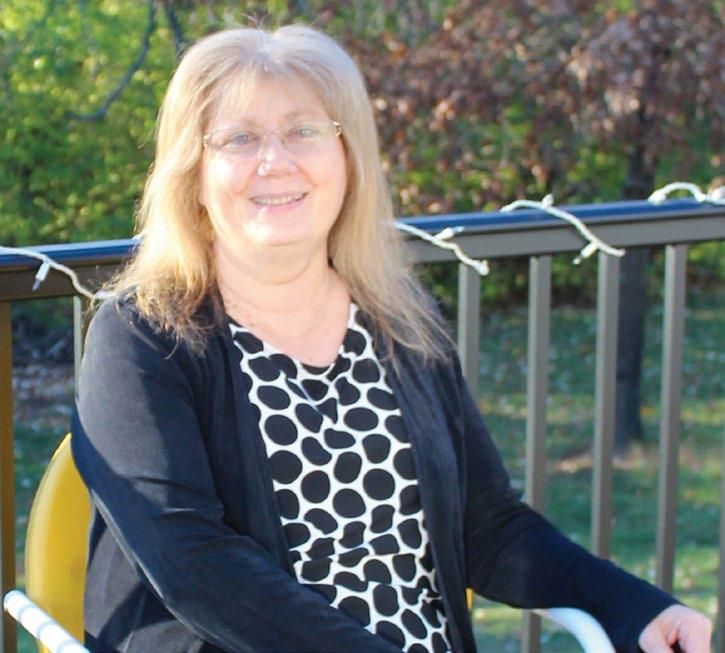
9 minute read
Adapting to COVID
C-SC graduates use education to acclimate to changing world.
The COVID-19 pandemic in the United States shocked the world and
fundamentally changed everyday life. People faced a new reality as they were
forced to adopt social distancing, mandated face masks and recommendations of
home quarantines that closed businesses and shuttered schools.
As is the case with any crisis, many people were quick to adapt and relied on
creativity and ingenuity to persevere. Though job duties may have been altered
because of the virus, people who had the ability to adjust and move forward
allowed them to thrive during a historic time.
Culver-Stockton graduates have shown for decades that the liberal arts
education they received helps them become acclimated to a world that is
changing daily.
The U.S. Small Business Administration, in consultation with the Treasury Department, created the Paycheck Protection Program to offer loans designed to provide a direct incentive for small businesses to keep their workers on the payroll. The PPP eventually provided 5.2 million loans worth $525 billion to American small businesses, providing critical economic relief and supporting more than 51 million jobs.
HOMEBANK, which has nine banking resource centers in Missouri and Illinois, was one of the banks that helped facilitate those loans.
“It was a very stressful, fast-paced, exciting and rewarding time,” said Caly Cramsey ’08 MBA ’14, chief financial officer at HOMEBANK. “We had never worked with a spur-of-the-moment government program before. There was some uncertainty.”
Cramsey said most of the people assigned to help with the PPP loans were redeployed from the bank’s business banking team. Culver-Stockton College alumni played an integral role in the process, as two members of the eight-person crew – Hays Klocke ’20 and Annie Hoffman ’20 – were completing coursework at C-SC in preparation for their graduation in May. Other members of the team included Hunter Baggett ’18 and Katie Smith, who also had taken classes at C-SC.
“It was kind of a baptism by fire,” said Klocke, who worked as an intern for the bank and was hired full-time in August 2019. “At first, we were kind of leery, but we wanted to jump on it. It is all about our customers. We wanted to see our customers be in the best position possible. Nobody could predict what was going to happen, and nobody was really prepared for it, so it was kind of our job to figure out what was going on and give our customers hope.
“And I think we did pretty well with it.”
Klocke estimates he helped about 60 local businesses, with the overall efforts of the bank helping nearly 300. Loans ranged from a few thousand dollars to a million dollars and the process was difficult with long hours and extreme attention to detail. Lucky for Klocke, the technical and leadership skills he gained as a student at Culver-Stockton College helped him to approach this difficult task with confidence.
“Our customers needed that money quickly,” Klocke said. “The day after I first found out about the (PPP) program, I got to the bank at 6 in the morning and left at 11:30 at night. And we did that for about a week straight. The hours, for a while there, were pretty long.
“What I had learned on the tax and accounting side from Culver-Stockton really helped. There was a lot of crunching numbers. But also, I used the professional skills I was taught. There were a lot of customers I had never talked with before,
Katie Smith, Hunter Baggett ’18, Caly Cramsey ’08 MBA ’14, Annie Hoffman ’20 and Hays Klocke ’20 and we developed relationships.”
Putting a young team in charge of the PPP loans was not a concern for Cramsey.
“I had worked with several of them before,” she said. “Seeing them on the job, knowing that they had completed courses under the Culver-Stockton professors, knowing the academic programs are there to give them help, it all made me confident. It’s a huge testament to Culver-Stockton.”
The PPP program concluded August 8, and now businesses which were given the loans are going through the loan forgiveness process. Members of the PPP team at HOMEBANK are returning to their normal jobs, but they must also keep up with their PPP loan forgiveness paperwork – knowing that a second round of PPP loans could be started at any time.
“When you hear their stories and know the people from the community who were impacted, and to put that money in the hands of our customers and help them keep their businesses alive and keep their employees employed, it made all the long hours and the long nights and the early mornings worth it,” Cramsey said.
When the pandemic hit and donning facemasks became a necessity, one alum’s thoughtful and talented approach transformed a required face covering into a fashionable accessory. Angela (Vinson) BuCare ’15 offers high-end designer bags, accessories and clothing, but specializes in hats for men and women, which are all offered through her Flaneuse Couture & Millinery website.
When the pandemic hit earlier this year, BuCare wanted to help in some way, and her liberal arts education inspired her efforts.
“One of the things that Culver-Stockton really taught me is when you work in business, or you work with a client, you kind of put a little bit of your energy and yourself into it,” she said. “It makes your relationship personable and authentic. My professors were always there for me. I was part of a sorority that did a ‘Clean Up Canton” activity. Everybody was helping others. Culver-Stockton showed me that it’s about helping other people, and by doing that, you’re helping yourself.”
BuCare read about people online saying they did not have face masks.
“I’m like, I can do this. I have sewing machines, I have elastics, I have material, I can make my own pattern. I can do this,” she said. “I started sewing and sewing and sewing and sewing. I just wanted to help. It was just the little drop in the pond that I could do as a human in this world.”
She used leftover material from previous projects to create the masks and customers only had to pay shipping costs. BuCare estimates she made more than 500 free masks in her initial efforts before deciding to make more stylish masks for herself. Her efforts to up the ante started with a lilac face mask that could be worn for more formal occasions.
“Immediately when I put that online, people were wanting to buy it,” she said. “I just wanted to wear something different than a regular face mask. That spurred the whole line of masks. People were saying the masks were so much fun. They said, ‘I can wear this to work. I can wear this with my outfit. This goes with a lot of my clothing.’”
Her most recent project is a new line of festive masks designed for the holidays.
“Women don’t want to wear the same face mask all the time or wear the ones that are disposable and get thrown away, ending up in a landfill,” she said. “They would rather have something that they can hand wash. They know it was hand sewn, and they know it was made in America by a woman.”
BuCare eventually wants her own brick and mortar stores, with one in New Orleans and others on both coasts.
BuCare has come a long way from making her own clothes at 8 years old out of a necessity because she was too tall to find clothes that fit properly. Her efforts in design and marketing have earned her much acclaim in her local community and beyond. She was nominated in 2020 as the “best fashionista” in a reader’s choice poll by the Baltimore Sun and national budget fashion blog The Budget Fashionista named Flaunese Couture & Millinery one of “Seven Small Fashion Brands to Support Right Now.”
“I’m really happy to say I’m now where I want to be career wise,” BuCare said.

Medical professionals across the country stepped up in a big way to serve on the front lines of the pandemic, including alumnus Jordan Hahn ’19. Over the course of his 18 months as a trauma nurse at Blessing Hospital in Quincy, Ill., Hahn typically would be passing medications and doing assessments on patients staying in the progressive care unit.
“We’re figuring out what the plan is for them to go home or figuring out what we need to accomplish before they can go on to their next level of care,” he said.
Hahn was transferred from his usual position to the fifth floor for nearly a month as Blessing readied itself for the influx of COVID-19 patients in the spring of 2020. Once the initial surge of patients waned, Hahn returned to his normal duties with the occasional “float” up to the fifth floor as circumstances warranted.
In late fall, as another surge of COVID-19 cases appeared in the Midwest, the fifth floor was filled with patients who had the virus, and Hahn had four COVID-19 patients of his own on the second floor.
Though no one can anticipate the details of a pandemic, Hahn said his classwork at Culver-Stockton and BlessingRieman College of Nursing & Health Sciences prepared him for his nursing position. He added, “They didn’t teach us what happens in a global pandemic. I can’t say that I’m necessarily scared of it, but it’s definitely concerning. Things change from day to day. We don’t know enough, but there’s research coming out all the time. A lot of diseases and stuff that we have, we know about it because we have years and years of research. We don’t have that for COVID-19.”
The surge in COVID-19 cases has strained the staff at Blessing Hospital, with offers of additional shifts and incentives for working longer hours. Hahn typically works three 12-hour days each week, but employees recently were offered the chance to work four 12-hour shifts.
Hospital-wide, employees must wear masks and goggles into every patient room, regardless of whether a patient has tested positive for COVID-19. When Hahn is working with COVID-19 patients, he wears a PAPR (powered air-purifying respirator) device over his head as additional protection.
Hahn said his work with COVID-19 patients has affected him outside the hospital as well, but his education helped him to cope with the added stress and to maintain his mental health.
“It is more important than I ever expected it to be,” he said. “(The first wave of COVID-19) changed everything. The college my fiancée was going to was telling her to go home, and when she learned that I would be working on a COVID floor, that put her parents at risk. I was living on my own at the time, and my parents were worried who would come take care of me if I would get sick.
“I was very, very isolated. I’ve always known that nursing was going to be stressful, but I literally went to work and came home, and I didn’t see anybody, didn’t really talk to anybody, for about a month.”
Hahn’s advice during these times: Wear your mask and do not believe everything you read.
“Some places say that masks will prevent the spread, and then you can find articles and stuff online that say masks don’t do anything and that the particles are so small that masks don’t work effectively,” he said. “Sometimes it’s hard to know what to believe. Be cautious of what you are reading. Try to fact check as much as you can. Don’t just read something online, take it and run with it. I think that’s part of what’s caused all the scares around the country.”







